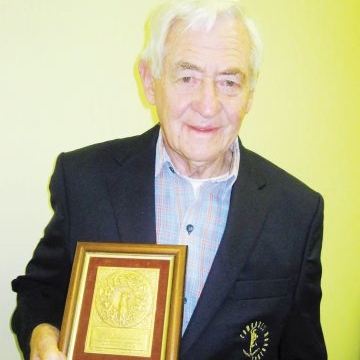click to dowload our latest edition
CLICK HERE TO SUBSCRIBE TO OUR NEWSLETTER


Published
5 years agoon
By
adminSAUL KAMIONSKY
Mekler, who grew up in the Arcadia Orphanage in Parktown, completed 11 Comrades and 403 races under the standard marathon distance. He also won 14 of the 41 standard marathons he contested in South Africa, Canada, England, Scotland, Greece, and Finland, and 13 of his 32 ultra-marathons – including the Comrades, Pieter Korkie, and London to Brighton.
He set new records at many of these events. He also set world records on the track for 40 miles (64km) and 50 miles (80km) running against the clock. He is the recipient of the Spirit of Comrades and Living Legends Awards.
Mekler’s newly released autobiography, Running Alone, tells the story of a man with a fiercely competitive spirit that carried him through harsh experiences in an era in which the first glimmerings of medical and scientific advances in the sport were emerging. It illustrates that no mountain proved too treacherous for Mekler to navigate.
One of those mountains was a feeling of being restricted by the rules, regulations, and discipline imposed by the Jewish orphanage. When he was 13 years old, Mekler regularly bunked out of the institution to go for runs to overcome this feeling. This is how his insatiable appetite for running began.
“My frustration led me to explore ways of loosening the shackles of confinement. The best and easiest way was to start running,” says Mekler.
He was so canny at this, he never got caught. But, he was eventually kicked out by the institution even though he tried to do a mitzvah (good deed).
“I was caught taking out some bread to someone who had missed a meal. I felt a mighty clout at the back of my head, turned round, and grabbed a pair of hands. It was the matron. They expelled me – within 24 hours I was gone.”
He used this fairly devastating experience as an opportunity to reunite with his father in a boarding house in Berea.
When Mekler made an early start to his Comrades career at the age of 20, he was prepared. “I started running when I was 13, running a half mile (0.8km) at the time and gradually building up. By the time I ran my first race, I had run about 7 000 miles (11 265km)in training.
“I ran to get fit, and I ran as many races as possible, sometimes 10 marathons a year. There was no such thing as scaling down or peaking. I would run 50 miles (80km) on a Sunday morning, and in the evening I would do a fast 10 miles (16km),” he says.
“I remember going to the Drakensberg to train. I would run before breakfast, after breakfast, and do a third run in the afternoon. One week, I ran 440km. My biggest downfall and biggest asset was exactly the same thing – my love for running. I loved it so much, that I did too much at certain times.”
It was this love for running that pushed Mekler on when he encountered surprising obstacles. In the 1960 Comrades, Mekler was cruising to victory and a second winners medal when he gashed his leg on a board placed across a ditch for the runners to cross. The board caused a painful blow on the leg, from which blood was streaming.
But, being a person who has always pushed his limits, Mekler refused to allow this obstacle to thwart him, and he soldiered on to breast the renowned Comrades finishing tape in what was then a record-breaking time of 5 hours, 56 minutes, and 32 seconds.
Mekler had no one to encourage him or offer him a lift home. “At times on my training runs, I became so tired that it surely would have been beneficial to cut short my session or stop altogether. But early on, for better or worse, I trained myself never to give in, only to drive harder.
“But, when I joined Germiston Callies, I found the Morrison family who were almost like foster parents to me. They encouraged and helped me along. As part of the Germiston team, I went with Wally Hayward and Fred Morrison to run the London to Brighton race, and we stayed with Arthur Newton. It was magnificent, a wonderful experience.”
Mekler says he is honoured to be classed as a legend of the Comrades alongside fellow five-time winners Hayward, Newton, and Hardy Ballington. “It is a humbling experience because these are people I really looked up to. I used to get their autographs, and there I was ranked with them. Great moments.”
One of the reasons his autobiography has taken 45 years to complete is that Mekler is an intensely private individual. While he shared very little of his hardships growing up even with his closest friends, he poured his soul onto paper.
“When I was 13, I started a diary and recorded all the training and races I did, how I fared, and how I felt. That became volumes and volumes across the years, and it became the crux of the book,” he says.
The quality of his running data is such that Professor Tim Noakes used Mekler’s logbooks as the cornerstone of his research into distance running. While a scientist like Noakes gleaned hard information from them, it is the stories behind them that feed into the richness of the book.
His advice to aspirant Comrades runners is, “if you are driven, work hard, enjoy what you do, and are able to motivate yourself, you are good to go”.
At the age of 87, Mekler still runs alone in Cape Town because “no one is slow enough to keep up with [him]”.
